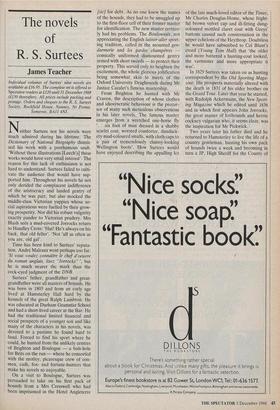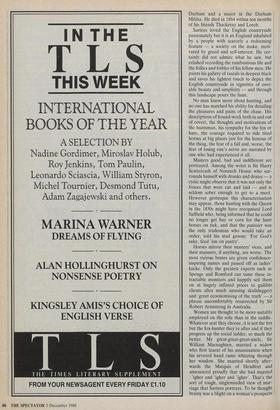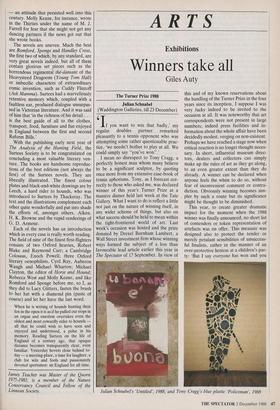The novels of R. S. Surtees
James Teacher
Individual volumes of Surtees' nine novels are available at f16.95. The complete set is offered to Spectator readers at £120 until 31 December 1988 (£130 thereafter). All prices include packing and postage. Orders and cheques to the R. S. Stale& Society, Rockfield House, Nunney, Nr Frome, Somerset, BAH 4NJ.
Neither Surtees nor his novels were much admired during his lifetime. The Dictionary of National Biography dismis- sed his work with a posthumous snub. 'Without these illustrations [Leech's] these works would have very small interest'. The reason for this lack of enthusiasm is not hard to understand. Surtees failed to culti- vate the audience that would have sup- ported him. Throughout his novels he not only derided the complacent indifference of the aristocracy and landed gentry of which he was part, but also mocked the middle-class Victorian yuppies whose so- cial aspirations were fuelled by their grow- ing prosperity. Nor did his robust vulgarity exactly pander to Victorian prudery. Mrs Blash sees a mud-covered Jorrocks return to Handley Cross: 'Hut! He's always on his back, that old feller'. 'Not 'alf as often as you are, old gal'.
Time has been kind to Surtees' reputa- tion. Andre Malraux went perhaps too far: 'Si vous voulez connaitre le chef d'oeuvre du roman anglais, lisez "Jorrocks" ', but he is much nearer the mark than the cock-eyed judgment of the DNB.
Surtees' father, grandfather and great- grandfather were all masters of hounds. He was born in 1803 and from an early age lived at Hamsterley Hall hard by the kennels of the great Ralph Larnbton. He was educated at Durham Gramtriar School and had a short-lived career at the Bar. He had the traditional limited financial and social prospects of a younger son and like many of the characters in his novels, was devoted to a pastime he found hard to fund. Forced to find his sport where he could, he hunted from the unlikely centres of Brighton and Boulogne — a bolt-hole for Brits on the run — where he consorted with the motley, picaresque crew of con- men, cad, fox- and fortune-hunters that make his novels so enjoyable.
On a visit to Boulogne, Surtees was persuaded to take on his first pack of hounds from a Mrs Cresswell who had been imprisoned in the Hotel Angleterre [sic] for debt. As no one knew the names of the hounds, they had to be smuggled up to the first-floor cell of their former master for identification. The new master certain- ly had his problems. The Boulonnais, not appreciating the English laisser-aller sport- ing tradition, called in the mounted gen- darmerie and les gardes champetres — comically uniformed dismounted gentry armed with short swords — to protect their property. This served only to heighten the excitement, the whole glorious jollification being somewhat, akin to meets of the Oxford University Draghounds during Mr Justice Cazalet's famous mastership.
From Brighton he hunted with Mr Craven, the description of whose clothes and idiosyncratic behaviour is the precur- sor of many such Meticulous observations in his later novels. The famous master emerges from a wretched one-horse fly `. . .six foot of man dressed in a shabby scarlet coat, worsted comforter, dunduck- ety mud-coloured smalls, wit') cloth-caps to a pair of tremendously clumsy-looking Wellington boots'. Hipw Surtees would have enjoyed describing the appalling kit of the late much-loved editor of the Times, Mr Charles Douglas-Home, whose fright- ful brown velvet cap and ill-fitting dung- coloured mottled claret coat with Greys' buttons caused such consternation in the upper echelons of the Heythrop. Doubtless he would have subscribed to Col Blunt's creed (Young Tom Hall) that 'the older and more battered a hunting-coat looked, the varminter and more appropriate it was'.
In 1829 Surtees was taken on as hunting correspondent by the Old Sporting Maga- zine. His prospects materially altered with the death in 1831 of his elder brother on the Grand Tour. Later that year he started, with Rudolph Ackermann, the New Sport- ing Magazine which he edited until 1836 and in which first appears John Jorrocks, the great master of foxhounds and heroic cockney vulgarian who, it seems clear, was the inspiration for Mr Pickwick.
Two years later his father died and he returned to Hamsterley to live the life of a country gentleman, hunting his own pack of hounds twice a week and becoming in turn a JP, High Sheriff for the County of Durham and a major in the Durham Militia. He died in 1864 within ten months of his friends Thackeray and Leech.
Surtees loved the English countryside passionately but it is an England inhabited by a people with scarcely a redeeming feature — a society on the make, moti- vated by greed and self-interest. He cer- tainly did not admire what he saw, but relished recording the rumbustious life and the follies and foibles of his fellow men, He paints his gallery of rascals in deepest black and saves his lightest touch to depict the English countryside in vignettes of envi- able beauty and simplicity — and through this landscape pours the hunt.
No man knew more about hunting, and no one has matched his ability for detailing the pleasures and pains of the chase. His descriptions of hound-work both in and out of covert, the thoughts and motivations of the huntsman, his sympathy for the fox or hare, the courage required to ride tired horses at big places just for the honour of the thing, the fear of a fall and, worse, the fear of losing one's nerve are narrated by one who had experienced it all.
Masters good, bad and indifferent are portrayed. Among the wcirst is Sir Harry Scattercash of Nonsuch House who sur- rounds himself with drunks and doxies — a cynic might observe that it was not only the fences that were cut and laid — and is seldom sober enough to get to a meet. However grotesque this characterisation may appear, those hunting with the Quorn in the 1830s might have recognised Lord Suffield who, being informed that he could no longer get hay or corn for the hunt horses on tick, and that the patissier was the only tradesman who would take an order, told his stud groom: Tor God's sake, feed 'em on pastry'.
Horses mirror their masters' vices, and their manners, if anything, are worse. The most vicious brutes are given confidence- inspiring names and passed off as ladies' hacks. Only the greatest experts such as Sponge and Romford can tame these in- tractable monsters and happily sell them on at hugely inflated prices to gullible clients after much amusing skullduggery and 'greet ecoonomising of the truth' — a phrase uncomfortably resurrected by Sir Robert Armstrong in Australia.
Women are thought to be more suitably employed on the sofa than in the saddle. Whatever seat they choose, it is not the fox but the fox-hunter they're after and if they progress up the social ladder, so much the better. My great-great-great-uncle, Sir William Macnaghten, married a widow who first learnt of his assassination when his severed hand came whizzing through her window. She married shortly after- wards the Marquis of Headfort and announced proudly that she had married 'igher and 'igher and 'igher'. That's the sort of tough, singleminded view of mar- riage that Surtees portrays. To be thought brainy was a blight on a woman's prospects — an attitude that persisted well into this century. Molly Keane, for instance, wrote in the Thirties under the name of M. J. Farrell for fear that she might not get any dancing partners if the news got out that she wrote books.
The novels are uneven. Much the best are Romford, Sponge and Handley Cross, the first two of which, by any standard, are very great novels indeed, but all of them contain glorious set pieces such as the horrendous regimental the-dansant of the Heavysteed Dragoons (Young Tom Hall) or imbecilic characters of extraordinary comic invention, such as Cuddy Flintoff (Ask Mamma). Surtees had a marvellously retentive memory which, coupled with a faultless ear, produced dialogue unsurpas- sed in Victorian literature. And it was said of him that 'in the richness of his detail. . is the best guide of all to the clothes, transport, food, furniture and fun enjoyed in England between the first and second Reform Bills.'
With the publishing early next year of The Analysis of the Hunting Field, the Surtees Society is to be congratulated on concluding a most valuable literary ven- ture. The books are handsome reproduc- tions of the best editions (not always the first) of the Surtees novels. They are liberally illustrated. The finest colour plates and black-and-white drawings are by Leech, a hard rider to hounds, who was introduced to Surtees by Thackeray. The text and the illustrations complement each other quite wonderfully and put into shade the efforts of, amongst others, Aiken, 1-L K. Browne and the vapid renderings of G. D. Armour.
Each of the novels has an introduction which in every case is really worth reading. The field of nine of the finest first-flighters consists of two Oxford heavies, Robert Blake and Raymond Carr; a Cambridge Colossus, Enoch Powell; three Oxford literary oenophilists, Cyril Ray, Auberon Waugh and Michael Wharton; Michael Clayton, the editor of Horse and Hound; Rebecca West and Molly Keane, and like Romford and Sponge before me, so I, as they did to Lucy Glitters, fasten the brush to her hat with a diamond pin (paste of course) and let her have the last word.
When he is writing of hounds hunting their fox in the open it is as if he pulled out stops in an organ and emotion overtakes even the oldest and most cowardly rider to hounds — all that he could wish to have seen and enjoyed and understood, a pulse in his memory. Reading Surtees on the life of England of a century ago, that opaque distance becomes transparently clear, even familiar. Yesterday hovers close behind to- day — a meeting-place, a time for laughter, a club for wits and fools and passionately devoted sportsmen: an England for all time.
James Teacher was Master of the Quorn 1975-1983, is a member of the Nature Conservancy Council and Fellow of the Linnean Society.




































































 Previous page
Previous page